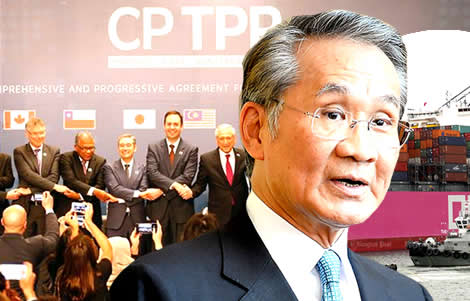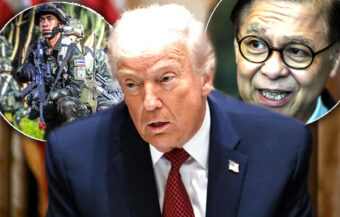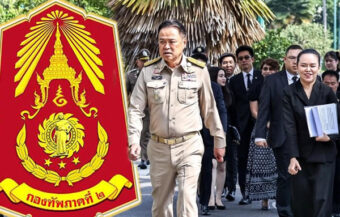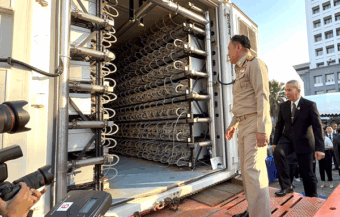Vietnam is emerging as Thailand’s key competitor for investment and trade opportunities. The fellow ASEAN member is already in the CPTPP pact which China applied to join in September and has a free trade pact with both the European Union and the United Kingdom which applied to join the Pacific pact in June. Earlier this year, as Thailand unveiled a plan to attract 1 million foreigners to live, work and invest here, it was revealed by former JP Morgan boss Mr Chayotid Kridakon, that Thailand’s level of inward investment from 2016 to 2020 had fallen by 50% to ฿360 billion.
A key Thai government committee made a decision last week that may be the start of a journey that could change the face of Thailand as we know it in the coming decades. A letter will be submitted shortly by the Minister of Foreign Affairs suggesting that Thailand should apply to become a member of the Comprehensive and Progressive Agreement for Trans-Pacific Partnership (CPTPP), a modern international trade pact and bloc, membership of which would bring with it significant changes for the Thai economy which is currently struggling to attract inward investment.

Just ahead of the ASEAN summit in Brunei came a strong indication last week that Thailand is, at last, taking steps to join the Comprehensive and Progressive Agreement for Trans-Pacific Partnership (CPTPP), a move which will have far-reaching consequences for the country and which will inevitably prove both controversial and painful for various parts of the kingdom’s economy and society.
The move by Bangkok follows years of exploring the possibility of joining the pact which has the support of large business concerns in the kingdom but is vociferously opposed by community groups and significant parts of the country’s agriculture sector.
China applied to join the CPTPP in September with the UK putting itself forward in June to join the trade bloc
China, in a surprising move, in September, applied to join the pact which currently has eleven members but which soon may be joined by the United Kingdom which applied to join in June as it seeks a new international future and is particularly focused on developing far east trade.
The UK is currently in discussions with Australia about a free trade deal and has just concluded a deal with New Zealand while, more significantly, at the end of last year, it signed a trade deal with Japan which went into effect this year.
Key committee in Bangkok set the ball rolling last week with a letter expected before the cabinet shortly
Early last week in Bangkok, following a meeting of the International Economic Policy Committee chaired by Thailand’s Minister of Foreign Affairs, Don Pramudwinai, a decision was made to have a letter drafted outlining Thailand’s intent to join the trade bloc which is to be presented to the cabinet and debated at length.
A formal decision on this at the highest level will take some time.
It is understood that Prime Minister Prayut Chan Ocha, at a cabinet meeting on October 12th, urged that the matter be expedited as Thailand seeks to find its way forward economically after two years of considerable economic decline and an urgent need for a new impetus.
Government departments and ministries to begin putting together a framework of pros and cons
Following last week’s meeting, it is understood that all agencies, departments and ministries are being tasked with bringing to the government’s attention, at the highest level, any and all issues relating to the implications of the Comprehensive and Progressive Agreement for Trans-Pacific Partnership (CPTPP) pact on the economy and broader Thai society to formulate a government strategy.
This will include opening negotiations for membership of the bloc but also for beginning consultations and discussions across the country between groups within different industries, society and communities.
However, it should be noted that a similar process has already been undertaken and completed by the House of Representatives before last week’s decision which had been postponed several times already this year.
This could be interpreted as a sign that this government is less than serious about finalising any application much less Thailand’s eventual participation in the bloc.
Undoubtedly, any decision on this issue is extremely sensitive politically both inside and outside Thailand.
Winners and losers from the pact to be identified, this trade agreement is more demanding than the RCEP
The government must establish who may emerge as winners and losers out of the move and address the latter group honestly with a transition and support plan.
Unlike the Regional Comprehensive Economic Partnership (RCEP) trade pact which is still to come into effect, the Comprehensive and Progressive Agreement for Trans-Pacific Partnership (CPTPP) is a more modern and demanding trade package that comes with intrusive limits and requirements for participating countries which will have significant knock-on consequences for Thailand.
CPTPP came about from the American inspired Trans-Pacific Partnership (TPP) which was jettisoned by Trump in 2017 but launched anyhow in 2018
The Comprehensive and Progressive Agreement for Trans-Pacific Partnership (CPTPP) came about after the United States, under President Trump, pulled out of the Trans-Pacific Partnership months after he came to power in 2017.
The pact now consists of eleven members including Australia, Brunei Darussalam, Canada, Chile, Japan, Malaysia, Mexico, Peru, New Zealand, Singapore and Vietnam.
The trade bloc was inaugurated on the 8th March 2018 in Santiago, Chile.
Thailand’s key competitor Vietnam is a member of the bloc, this will be drawing Bangkok’s attention
For Thailand, the presence of both Malaysia and in particular Vietnam on this list represents one of the main reasons why the kingdom is being forced to enter negotiations to join the bloc at the same time as it pursues a free trade agreement with the European Union which already signed a pact with Vietnam in May this year while Thailand’s fellow ASEAN member signed a free trade pact with the United Kingdom at the end of 2020.
Vietnam is emerging as Thailand’s key competitor for inward investment as the kingdom remains, despite its goal of transforming itself into a high tech, high-value economy, stuck with the need to attract manufacturing investment.
Sinking deeper into the middle-income trap
This is the dreaded middle-income trap that Thailand has been increasingly pushed into and in which it is increasingly seen as ill-equipped to compete.
The US-China trade war, the COVID-19 crisis and other factors within the country such as its propensity for coups, rising inequality, a less developed education system and an ageing population have severely hampered its prospects leaving it behind its competitors.
Thailand is still negotiating with both the European Union and the United Kingdom but these talks are moving slowly as the terms of these trade agreements will be similar if not even more demanding than those imposed by the Comprehensive and Progressive Agreement for Trans-Pacific Partnership (CPTPP) or will at least take the form of a more modern trade agreement with a wider definition of trade to include the trading environment and a range of social and regulatory issues.
Thailand, as part of ASEAN, signed on for the Regional Comprehensive Economic Partnership (RCEP), a bigger free trade pact but less demanding
At the end of last year, Thailand signed on as a member of the Regional Comprehensive Economic Partnership (RCEP), a bigger trade pact but far less demanding agreement involving the ASEAN community, China, Australia, New Zealand, Japan and South Korea.
World’s biggest free trade deal just signed will be a huge boost for the Thai economy and exports
The key driver for Thailand, at this point, is the possible emergence of a lack of trade connectivity that the country can offer prospective investors.
Thailand’s largest direct investor, Japan, is increasingly looking elsewhere with regard to future investment decisions in automobile and electronic production.
Plummeting investment in Thailand is a key concern for the government despite its hype and hoopla
Another complication is Thailand’s relationship with China and Taiwan as the latter from 1959 to 2018 was the third-largest investor in Thailand behind the United States and Japan.
In that period, Taiwan invested $14.6 billion in Thailand or ฿481 billion.
In April this year, as Thailand announced its new policy to attract up to 1 million wealthy foreigners to come and live and work in the kingdom, it also revealed that inward investment to the country had fallen sharply over the last five years since 2016.
Economic plan to put the smile back on Thailand’s appeal to western foreigners to live and work
That plan, which is currently being pursued by the cabinet and Deputy Prime Minister Supattanapong Punmeechaow was the brainchild of Mr Chayotid Kridakon, former managing director of J.P. Morgan Thailand.
New plan for the Thai economy could see an elite foreign visa scheme generate up to 6% of GDP
The former top banker, earlier this year, revealed that inward investment to Thailand in 2020 was only ฿360 billion representing a 50% drop in the previous five years despite the kingdom’s oft-reported success in attracting investment proposals for its flagship Eastern Economic Corridor project.
To some extent, behind the hype and hoopla, is a very different and grave picture for the country’s economic planners.
Taiwan applied to join the CPTPP a week after China
Less than a week after mainland China applied to join the Comprehensive and Progressive Agreement for Trans-Pacific Partnership (CPTPP), it was reported that Taiwan had also applied to join the pact on September 22nd.
This sparked a predictably angry reaction from Beijing.
Taiwan is already a member of the World Trade Organization and the Asia-Pacific Economic Cooperation (APEC) inter-governmental forum.
It is also reportedly at an advanced stage in its negotiations to secure a free trade deal with the European Union and the United Kingdom.
Government preparing a framework document and will appoint a PR panel to control its messaging
After the key committee in Bangkok decided to move forward with Thailand’s application, it emerged that the foreign minister and officials at the Ministry of Foreign Affairs and Ministry of Commerce would be preparing a negotiation framework to be discussed by the cabinet.
The government is also appointing a PR panel to control government messaging on the subject or to counter ‘fake news’ as the ministry put it this week.
Any firm decision by the Thai government to join the trade pact will bring with it an anticipated firestorm of opposition.
Planned funding of aid to assist sectors, communities hardest hit by the economic fallout of the CPTPP
This week, government sources suggested that one of the plans that would be developed by the government would be funding to help alleviate industries and sectors which will undoubtedly lose out if Thailand does eventually join the pact and accept its framework of conditions.
Any such outcome would also come with time-limited exemptions for regulations or terms which may severely impact parts of the Thai economy.
The Comprehensive and Progressive Agreement for Trans-Pacific Partnership (CPTPP) pact brings with it both advantages and disadvantages for Thailand.
Declining inward investment is the key dynamic that is forcing the government’s hand on this thorny issue
However, KKP Research, a research arm of Kiatnakin Phatra Bank has produced a study on the proposition which argues that it is a third dynamic linked with what Thailand stands to lose by continuing to opt-out of the agreement that represents the greatest threat which may already be having an effect.
That centres around declining inward investment.
The point is also being made that any future deal with either the European Union, United Kingdom or a new deal with the United States, will inevitably come with conditional attachments which Thailand must be ready to accept sooner rather than later if it wants to compete in a more streamlined and open-world marketplace.
Very little to gain by way of increased exports as Thailand already exports to all eleven countries
On the other hand, KKP Research has suggested that Thailand stands to gain relatively little in terms of increased exports as it already ships to the 11 countries in the pact which make up 30% of the kingdom’s exports.
The upside may be a rise in exports to the Canadian and Mexican market but it is decidedly limited.
The GDP of the Comprehensive and Progressive Agreement for Trans-Pacific Partnership (CPTPP) is currently 13.5% of the world’s output but this would rise to 16% if the United Kingdom joins the bloc and consequently, the CPTPP countries together would then represent 40% of Thailand’s export market.
Problem with the CPTPP is its impact on agricultural production, generic drugs and state supports
The main problem for Thailand with the proposed trade agreement is related to the agriculture industry where Thailand will face stiffer competition and controls.
In addition, Thailand will be required to join a convention relating to the sharing and protection of new plant species which may particularly impact its strategic competitiveness as a rice grower and exporter.
Many opponents of the pact have predicted that it may mean Thai farmers having to pay to use new rice plant seeds in the future, further increasing costs and restraining the ability of the kingdom to compete.
In addition to this, the pact would extend the protections enjoyed by large global pharmaceutical companies in relation to the production of generic drugs while also restricting the production of generic versions of the drugs as new more demanding patent requirements will come into effect.
Entrenched positions across the country in opposition to this Pacific trade pact as an election approaches
Both these issues are of critical importance to the Thai public and have already generated entrenched opposition to the Comprehensive and Progressive Agreement for Trans-Pacific Partnership (CPTPP) pact which may well become an election issue even as the Deputy Prime Minister and Minister of Foreign Affairs Mr Don pursues the quest to join the block.
Thailand could see a General Election flight in 2022 with political parties always anxious to portray themselves as both populist and nationalist, a message that plays well consistently in the kingdom.
Concerns for Thailand’s electricity and energy sectors
These issues have been particularly identified by the Economic Intelligence Centre of the Siam Commercial Bank in its assessment of the potential impact of the Comprehensive and Progressive Agreement for Trans-Pacific Partnership (CPTPP).
There are also strong concerns about the impact of the pact on Thailand’s energy sector such as the cost of electricity which is highly subsidised by the government.
One of the great but quiet success stories of the Thai economy is its electricity supply network. The pact may put pressure on the government to end support for state sector firms.
However, it has been pointed out by KKP Research that the trade agreement allows governments to support firms that provide a vital public service that is critical to the essential interest of the country.
Big business and the sector at large supports the pact
Thai industry leaders and, by and large, the business sector has long urged the government to join the pact.
Industry boss urges Thailand to join alternative Pacific trade pact and plan for a long recovery from virus debacle
Many have argued that the country, coming out of the virus emergency and after suffering severely from the US-China trade war in 2019, needs a new more positive outlook.
However, successive studies and even the most optimistic assessments from the business sectors have been forced to accept that many smaller and less competitive Thai firms may not survive the impact of the Comprehensive and Progressive Agreement for Trans-Pacific Partnership (CPTPP) on Thailand’s economy which will be forced to modernise faster and adapt to international standards.
This will also mean administrative and legal reforms to bring Thailand’s legal system and rule of law into line with international norms.
Long negotiation period ahead, the question remains: Is Thailand ready to give up its independent nature?
If the government decides to give the green light to apply for membership of the pact, a long negotiation process lies ahead.
In the meantime, economic consultants are advising that the government should open up a frank, comprehensive and honest debate within the country on what the pact will mean for the future and prepare now to compensate those in the commercial sphere and indeed in society who will lose out to what will be a modernisation and rationalisation process aimed at transforming the Thai economy into a more competitive player.
What that may look like in the future and how the Thai public perceives it is another matter in a country that has for so long pursued its own cherished, independent path.
Join the Thai News forum, follow Thai Examiner on Facebook here
Receive all our stories as they come out on Telegram here
Follow Thai Examiner here
Further reading:
Trade pact with Hong Kong as Thailand negotiates both Chinese and new western trade relationships
RCEP deal agreed as India opts out – busy Bangkok ASEAN summit concludes on a low key
Chinese FM to visit Thailand in a Covid battered world of raised tensions and potential conflict
Prime Minister indicates that the cabinet reshuffle will be complete very shortly with no problem
Thailand’s economy has become dependent on government expenditure to stay above water
Thailand and US aim for a new more ‘proactive’ trading relationship as ambassador meets Prayuth
Rice price spike but drought conditions to recede – security concern for the Mekong river
US suspension of Thai preferential trade partner status part of Trump’s ongoing trade war


















